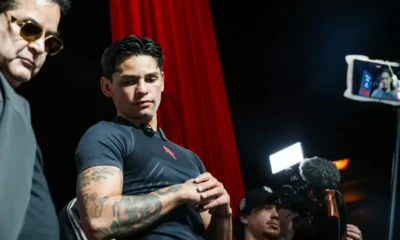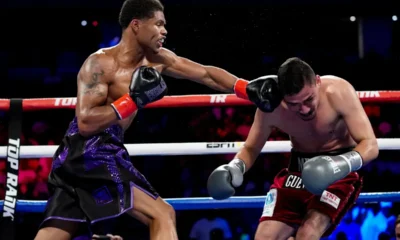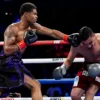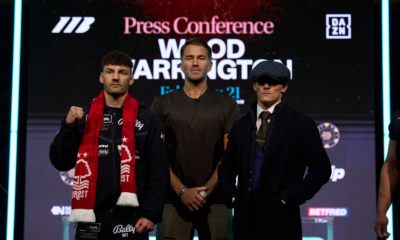(This commentary item on British heavyweight Dillian Whyte originally appeared on David’s website www.boxingwriter.co.uk and make sure to follow him, specifically for all things boxing in the U.K.)
Dillian Whyte is a heavyweight boxer. He is now in his mid-thirties, 35 in April. The best of him, his prime, such as it was, is now in the books. A late-starter, Whyte began with clumsy feet, peculiar habits forged in other combat pursuits, and the remnants of a boyhood Jamaican drawl to his voice. Relative success in an old-school ‘tear-up’ with a surging Anthony Joshua encouraged investment in his fortunes. Flaws were worked on, weakness polished toward competence and natural power channelled productively.
Big Derek Chisora proved too resourceful to conquer definitively, but Whyte took the contentious decision and ran with it. He beat Helenius on one of the giant Finn’s passive evenings and survived a knockdown to beat Joseph Parker. And then there was the Povetkin year.
A knockout loss. A knockout win.
His busyness, resulted in momentum and that impetus, in an otherwise slovenly field, forced him toward the top of the division. Dancing from novelty heavyweight, to contender, to avoided boogeyman through to the supposedly exposed veteran of today. All in just a handful of short years. Fury adding an exclamation mark to the current characterisation of his part in the heavyweight picture.
In Jermaine Franklin, an ill-defined, undefeated and as yet unverified heavyweight out of the Motor town of Detroit, Whyte faces a fighter with some stylistic similarities to his own. Wider stance perhaps, a right hand Franklin launches from the bleachers lacks Whyte’s explosiveness but they certainly share an appetite for a heated exchange. Whyte more concussive, Franklin quicker.
Saturday’s fight will probably lack finesse. But it might be fun. And for Whyte, defeat is unconscionable.
Whyte’s strategy must be different
As an advocate of fighters fighting, taking calculated risks with matchmaking – an ever rarer combination in the modern era – a loss cannot be used to discredit a contender too unduly. Whyte fought poorly versus Fury. He won’t be the last to do so. Fury’s proportions and variety of attributes will confound better fighters than Whyte. Losing was the expected outcome but the sadness was Whyte boxed like a man who agreed with the pre-fight consensus. Defeats of that nature can eat away at retired fighters more than simply meeting a better man.
Fury wasn’t the marque Whyte really wanted. Too much reach, too much nouse. and it showed in Whyte’s lack of confidence. Wilder as the King to topple may have been different had Whyte secured that shot when he, Hearn and a sprinkling of others thought he deserved it.
Different fighters, different nights. Outcomes, perceptions, careers; all could have been different.
Whyte can still have bigger nights beyond Saturday if he wins, but it is hard to build a case for him to reach the mountain top while fighters as cute as Fury and Usyk are contemporaries. Fellow Brit Joe Joyce would be too durable and busier it would be easy to conclude too. A loss always shifts the narrative. A pendulum can swing quickly on the summary of a fighter’s career. However unjust that may be.
Whyte has things to prove to the boxing public, his rivals and perhaps, as with all returning fighters, to himself. His left hook will be key. It is thudding when it lands and is an accomplished punch. Franklin showed, albeit some years ago and against the colourful trial horse Rydell Booker, that he leaves the ‘window open’ for the shot.
Will Franklin pose a threat?
The American is making a huge leap in class by accepting this fight. His readiness is a concern on the basis of his weight being close to 20-stone last time out, 277 pounds, after a long hiatus enforced by economic necessity. Boxing doesn’t pay the bills for every fighter. The two-year absence, an acrimonious split from his then manager and a bankruptcy process left Franklin inactive and potentially ill-prepared if Whyte starts to have success. Even when he was busy, Franklin was fleshy at 240.
Despite the heft, he could prove to be too hungry for an ageing Whyte, or too grateful for the opportunity and over-matched. Only the fight can answer. Motivation couldn’t be clearer; promoter Eddie Hearn promising the 29-year-old he would fight Anthony Joshua next if he pulls off the upset.
Whyte’s superior authority in his punches should prove decisive on Saturday. Franklin has good hand speed in flurries but he doesn’t have pop in his long-range right hand on the evidence of the Jerry Forrest and Rydell Booker fights. His jab wanders from good to fitful and assuming Whyte is in shape he should be able to set up his left hook and overcome stubborn resistance in a wild scrap somewhere after half-way.
It will be interesting to see if the tutelage of Buddy McGirt, a new trainer for Whyte, brings any polish to his attributes too.













